
HEADSPACE – No Longer Anonymous
Anthony Morgan
May 2012
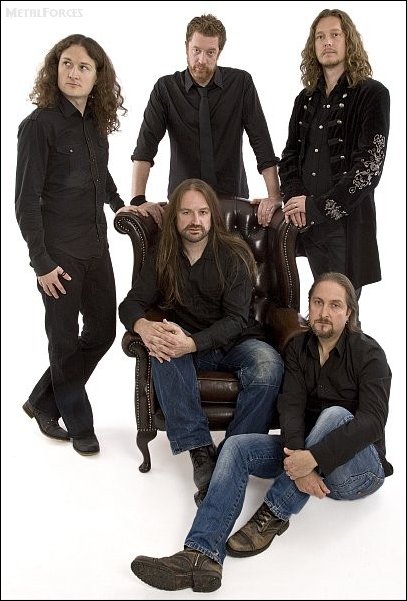
|
United Kingdom-based progressive metal outfit Headspace formed in 2006. Consisting of five musician friends mainly known for their session work, the group was an avenue by which they could reconnect. The following personnel comprise the quintet’s line-up; keyboardist Adam Wakeman (Ozzy Osbourne / Black Sabbath), guitarist Pete Rinaldi (Hot Leg), vocalist Damian Wilson (Threshold), bassist Lee Pomeroy (Rick Wakeman / Take That), and drummer Richard Brook (Rick Wakeman).
“It was basically four of my friends who I’d worked with on other projects, professional session musicians that I’ve worked with in various different projects and bands,” supplements Adam Wakeman, keyboardist and co-founder of Headspace. “We had a common love for music, and wanted to put a band together that could be something of our own really. We wanted to play some of the music that we wanted to play, rather than be paid to play stuff that maybe we wouldn’t wanna play if we had a choice (laughs). We got together, and pretty much wrote about ten songs. We didn’t want to have any pre-conceived ideas of how the band would sound. We didn’t say ‘Let’s start a progressive metal band.’ It could quite easily have turned into Keane, or a different sort of band. We got into a rehearsal room, and we just started playing. That was kind of how the band got together, like it would’ve done when you were 16 to 17-years-old really.”
Headspace took a lengthy amount of time to select its moniker. “It took us an awful long time to get something that we were happy with,” the pianist chuckles. “It was just something that somebody said, and it stuck. That was it. Every other name we came up was never quite as good as Headspace.”
Progressive ensembles greatly influence Headspace’s material. “Personally I would say Yes, Genesis, and Led Zeppelin are three influences that I would like to think are shown on the album,” Adam cites. “I know that Lee is a big Gentle Giant fan though, so I’m sure that he’ll have tried to sneak some Gentle Giant licks in there somewhere. I think it’s important to not deny your influences, and try to make you’re doing… What we’ve tried to do is put all the things we love about other bands, and… We’re fans of Dream Theater, but sometimes the technicalities get in the way of the songs for me. Some of the early Yes I think managed to find a really fine balance between technical musicianship and songs, and I think that’s what we try to do. We love the kind of technical playing in Dream Theater, but we try to maybe keep more of an essence of songs which is more prevalent in early prog rock music.”
Technicality has to have a compelling reason to exist within a track, as opposed to technicality surfacing for the sake of technicality. “With this album, we didn’t really plan anything,” the ivory-tinkler divulges. “We just did it as we went along. The concept started very early on, and we knew that the album had to make sense. We didn’t think though ‘We’ve gotta have a keyboard shredding minute followed by a guitar shredding minute.’ It was whatever evolved naturally as we were making the record. That’s why one song is three minutes long, and another song is 15 minutes long. It just didn’t feel right to end it. It wasn’t like ‘Alright, let’s make a 15-minute song.’ It just didn’t feel like it had come to a natural conclusion, and it almost makes itself really when you’re looking at an album like that.”
Adam’s father Rick Wakeman – erstwhile keyboardist for progressive rock band Yes as well as a session player who has supplied parts to tracks by the likes of Black Sabbath, Ozzy Osbourne, David Bowie, T. Rex, Elton John, and Cat Stevens – is a huge influence on his playing. “He was the reason I chose this career,” he admits. “I started playing piano when I was about eight years old, and went to the classical piano grade. I saw him play when I was about ten or 11 years old in one of the incarnations of Yes at Wembley Arena, and that was the decision. I just saw him play, and thought ‘Right, that’s what I wanna do. I wanna do that.’ There was no ‘If that doesn’t work out, I’m gonna do something else.’ I just had that in my mind, that that was what I wanted to do. He was a huge influence from that perspective.
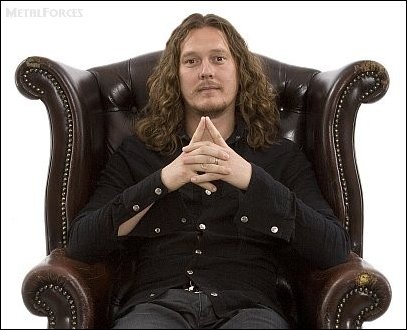
|
“He’s obviously accomplished so much in his career. It’s been great, and it’s always been good. I’ve worked with him a lot; we’ve recorded seven albums together, and we’ve toured extensively for about ten years. I feel I know him better than anybody. I’ve spent so much time with him musically, and it’s been great. He’s been a huge influence, and still is to this day. I still ask him for advice; I ask his opinion on things relating to music especially and the business because he’s been around it a long time.”
Headspace self-issued four-track EP I Am during 2007. “That came from the recording process we did,” the organist recalls. “We rented a big house called Ty Mawr which was right over on the west coast of Wales near Aberystwyth I think, like a holiday house. Somebody told me the other day that it’s now a restaurant place. We claimed to be a family with three children (laughs), cleaned out the main room in this big house, and just filled it with recording equipment. We came up with about ten songs, and finished them off back at my studio at home. We didn’t feel it was strong enough for an album, and we were very kind of conscious that the first album had to be the best that we could possibly do. It wasn’t a case of ‘This is one album; let’s start working on the next one.’ We took the four songs which we felt were the best of the ten, and put the EP out. It was really just so we had something to give to fans after we did the support slots with Ozzy. We did London, Birmingham, and Dublin in Ireland – supporting Ozzy in July 2007 I think it was – and that was great.
“It was amazing, because we got to play our own music. To play other people’s music onstage is fantastic and has to be the best job in the world, second only to playing your own music onstage in front of a load of people. To actually have involvement in something in the writing process and then take that to the stage and see people get into it, that’s the most amazing kind of thing. We haven’t done many shows with Headspace purely through commitment to our other projects – we just haven’t had enough time to all get together and play. We made a decision about a year ago to not do any shows until the album was done.
“Our time together is so difficult to organise, so it seems we need to sort of focus on one promotional point. We’re actually gonna do a European run in September. We do one other Black Sabbath show in August, and that will give us some time to get some rehearsals in. I then think we’re gonna do seven shows around Europe and maybe two or three in England, just to play all of the album. That’s what we wanna do; we wanna play the whole album from start to finish, and we’re lucky enough to be able to do that because we haven’t got a back catalogue of loads of albums (laughs).
“We just pressed up a 1,000 copies of I Am though in 2007, sold a 1,000, and that was the initial interest in the band. We were pleasantly surprised that there was actually some interest in it. We were very conscious after that, that we weren’t gonna go back to the other material we had. We were gonna start again, and that’s where the idea of this concept album started. We developed it from there. The EP was almost just an introduction to the band, really.”
The prospect of I Am undergoing reissue through a record label is uncertain. “It was never really intended to be a mainstream release, so we didn’t look for labels to release it at the time,” Adam explains. “We had the opportunity to do these Ozzy support shows, so we just thought ‘Alright, let’s get something out there so people can hear what the band’s about.’ I don’t know. Maybe in the future we’ll re-release it, but we’ll see what the interest is with I Am Anonymous first. I think we’ve still got some for sale on our website you can buy through mail order, or you can get it on iTunes. It’s important to have it there, but I don’t think there’ll necessarily be a re-release any time soon. We want to concentrate on the album, really.”
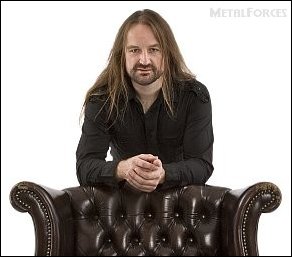
|
“It’s gonna take us another couple of years to get the next album done, that’s for sure. We’re conscious about not taking a step backwards. It’s actually something my dad said to me a long, long time ago when I was a kid. It actually didn’t involve musicianship, but involved a house where we used to live. I said to him ‘That was such a great house. Would you ever wanna move back there?’ He said ‘You should never go backwards. Always go forwards, and that applies to everything. Always move forward, never go backwards.’ That’s kind of stuck with me I think. I think it’s important musically that we don’t take a step backwards, because that EP came out in 2007 – five years ago. We’ve moved on a lot as a band since then, so I think we’ll try to get the next album done in a couple of years. It all depends on everyone’s commitments really, but once I get back to the UK after this summer run then certainly we’ll start getting together and make a start on the next album.”
The bulk of Headspace’s material is composed by the pianist together with guitarist Pete Rinaldi. “Pete is a very, very good friend of mine, and we work well together,” he enthuses. “We sit down, and I’ll maybe come up with some chords. He’ll then come up with a little line, and it happens quite naturally. It comes quite quickly because we can be honest with each other. He can play something and I think ‘Maybe try playing it this way,’ and he’ll play a different phrase. Maybe he’ll suggest to me to change my piano part, maybe do it in 3/4 instead of 7/4 or whatever. We can be honest with each other without feeling anyone’s gonna get offended by changing what they’re writing, because we know each other so well. I can pretty much play something, and Pete can say ‘That’s a bit shit.’ I can go ‘Okay, we’ll play something else,’ and then he can play something to which I can go ‘That’s a bit shit as well.’ We can get the process moving quite quickly by just having an honest approach to what we’re doing together.”
Headspace’s members’ various other musical commitments mean that exchanging mp3 files via email is a necessity in authoring new tracks. “Pete and I would get together for a couple of days every few weeks whenever I was back in the country, or whenever Pete was back in the country,” Adam remembers. “We would spend a couple of days and just start building tracks, start building sections of the songs. We would then send them down to Damian. Damian would live with them for a little while, make suggestions, and come up with some vocal melodies. I would tend to go to his house and record his vocal melodies, and then we’d live with that for a little while. Lee would come in and put some bass down, and maybe change a few of the things. That was kind of how it worked.
“It was built gradually, and it was the best way to do it because we couldn’t all get together once a week in a rehearsal space. There isn’t time in any of our schedules to make that happen, so this was the only constructive way to make the album. It worked really well. Originally we were a bit frustrated because it was taking so long, but I think that made for a better album because it gave us a lot of time to live with each part and each song, and make changes. We demoed the album at least once all the way through before we re-recorded it, so we could make the necessary changes to make it an album we were a 100% happy with.”
Between 2007 and 2012, Headspace has grown. “I think we’ve just kind of grown into the band we are. I think back in 2007, we weren’t really quite sure what we were,” the ivory-tinkler confesses. “We weren’t necessarily in the comfortable position we’re in now. We’re quite proud of what we’ve made, the record that we’ve made, and the kind of band we are, which is unashamedly prog rock, prog metal or whatever you wanna call it. I don’t think we could say that in 2007 though. I think we were a rock band with a bit of prog thrown in there, and we weren’t quite as confident to be able to say we were a prog rock band back then.”
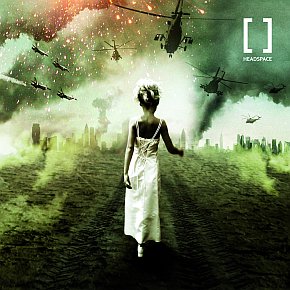
|
May 2012 debut full-length I Am Anonymous remained untitled for much of its songwriting process. “We just could not decide, so it was nearly untitled altogether,” Adam concedes. “We were gonna have no title, but we thought that would get a bit confusing. When you have to go to order it in a record shop or something, how do you order an album that doesn’t have a title? We thought better of that. If I explain a bit about the concept behind the album itself, that might help with the title as well. It’s kind of about us all as individuals, and our relationship with humanity. Fundamentally that’s what the album is about.
“It looks at the battles and turmoils that you have in your mind all the way through your life, and the cycle of that. When things settle and the chaos clears and everything becomes clear, then it descends back into chaos again. That’s kind of reflected by current events in the world. There are references to war and religion, and things that affect us all during the cycle of life. There will continue to be wars, there will continue to be problems with religion, and there will continue to be personal problems for people.
“The album is about us – all of us individuals – but nobody in particular. The title I Am Anonymous became really suitable because it’s not about anybody, but about everybody – there’s no specific one person. It seemed to work really well, and the more we lived with it the more we thought it was the right title. Originally Pete and I got together, and we were talking about how we wanted the artwork to look. The artwork has the little girl on the front cover walking off into the kind of war torn chaos. That stark contrast between the innocence of a child and the chaos that a war brings, and the fact that you don’t know who that little girl is, she’s anonymous like everybody. I think it worked really, really well. Once we settled on it we were all in agreement, which is good.”
The theme of war is reflected in the composition ‘Soldier’, a number which solely consists of piano and vocals. “That started originally as a song that Damian wrote on acoustic guitar,” the organist discloses. “It’s a beautiful, beautiful piece of music, and beautiful lyrically. He was playing it on acoustic guitar, and it seemed to fit with what we were doing. It was a kind of nice, stark contrast to the heavier stuff on the album, and I just changed the chords because it was all in a major key and it was all very folky. I said ‘You sing the melody, and I’ll sit at the piano and just change the chords.’
I love the kind of chord patterns that repeat, that change just slightly from the chorus into a bridge for example. I just played around with some chords. We just recorded a few versions of it, lived with it for a few weeks, and then I just re-recorded the piano. It seems to work really well. I can’t even remember what it used to sound like when he played it on acoustic guitar, but it certainly became more Headspace by taking it out of a major key and putting it in a more melancholic, minor key.”
Critiqued against its fellow tracks, ‘Soldier’ isn’t representative of I Am Anonymous. “It’s totally different,” Adam concurs. “I think the record company were talking about sending out a couple of tracks on a sampler in America, and that was one of the songs they suggested. We all said ‘No, definitely not,’ because you don’t want a situation to arise like… I remember back in the day when Extreme had that album Pornograffiti (August 1990), which was the album that ‘More Than Words’ was on. The record company thought it was a good idea to release that as the first single in the UK, so all these middle-aged mothers were buying the album thinking that this nice American sounding acoustic band have released this album.
“I think they had an awful lot of returns where people had bought the album thinking it was one thing, but were very disappointed. We certainly don’t want that to happen, but want people to know what they’re buying. ‘Soldier’ is a beautiful moment in the album, but it’s by no means representative of what we are and what we’re about. That’s the beauty of making an album you want to make though, that you can do what you like. It doesn’t seem out of place to us to have a piano and vocal three minute passage on an album. It tells a part of the story, and I think it works really well.”
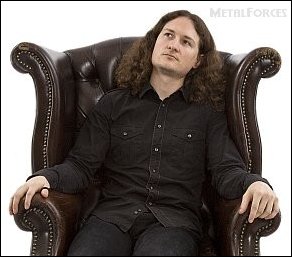
|
The organ stylings which inaugurate ‘In Hell’s Name’ paint the image of a church funeral. “That’s exactly it,” the ivory-tinkler confirms. “‘In Hell’s Name’ is about religion; the effect of religion on people, the power that it holds, the importance, and complete lack of importance that it has. I love that Yes track that starts with the organ, but I can’t remember the name of it. Anyway, I wanted to have an intimate moment with kind of a small sounding church organ that just gradually builds so that we could kind of launch into the main part of the song with the heavy riffs. I sat down and played it, and pretty much the first time through I knew the chord pattern that I wanted to use.
“I just wanted to do it in different time signatures. Rather than work it out and say ‘Right, let’s have a bar of six, a bar of four, and then change to a bar of seven,’ I just sat down and played it as it felt natural. That caused so many problems when we went to play it live because no pattern repeats. The chords are kind of similar, but the time signatures change each time which makes it a nightmare to play live. We then brought the choir in as well. Soon as I did that part, Damian came up with some melodies. I was really keen to get a choir to sing on that track to make it really feel just more church-like, more religious, and more epic. We got a slow chamber choir to come and sing on that, which was amazing.”
‘Daddy Fucking Loves You’ came to fruition through a pub encounter Damian experienced with a soldier. “The soldier had just come back from six months in Kosovo, Macedonia or somewhere,” Adam recounts. “It was quite a long time ago, and he remembers a conversation the guy had clearly in an emotional state. He had just come back. Things were changing, and he was very much expressing how difficult it is being away from his family while he’s fighting wars and not knowing if he’s coming back. I think that probably affects every person who works for the armed forces. The more the evening progressed, he was getting a bit more lubricated.
“He had his kid in his arms who was six or seven, and he was just trying to explain to him why he goes out and does what he does, why he goes to these countries. I think it got to the point where he said ‘Look, Daddy fucking loves you. That’s why he does what he does, why he goes out to these countries.’ It was such an emotional statement that when Damian told us that, we were like ‘That is a great title for a song.’ You can read it and think it comes from a place of aggression, but when you maybe hear where it really came from you hear it as desperation rather than anger.”
Adam is a father to three-year-old twins – a boy and a girl – and a seven-year-old daughter. The musician can likely relate to the composition’s plight, as well as father Rick. “One of the great things about all music is it can be written from one place, but can mean something different to somebody else,” he exalts. “If you can achieve that with music, then you’ve nailed it. There’s so many songs that are generic kind of love songs that people relate to, because they can relate to that emotion. That one thing – ‘Daddy fucking loves you’ – any parent is going to at some point have felt frustration or desperation or anger with their children. That’s not to say that one person’s view of the song is right or wrong. It’s just where that title came from and where that whole song came from, the kind of desperation and emotion between a father and a son.”
‘Fall Of America’’s title, meanwhile, will likely garner much criticism stateside. “We’re gonna get a load of shit for that song, but if you can’t say what you want then we don’t live in a free society,” the pianist contends. “It’s not specifically aimed at America, but could be any country in the world. It’s just currently America is the Western super power. Like the album, the song is about our interaction with human nature, the inevitable rise and fall of countries, and people, life and death. It just so happens that nothing stays the same – everything’s constantly changing. If it wasn’t America it would be another country. In a 100 years time, it will be another country. It’s just the best example at the moment of the rise and fall of a super power, and it will rise back up again. It’s an observation, not an opinion. The song is an observation on events, and things that are happening today that affect all of us.”
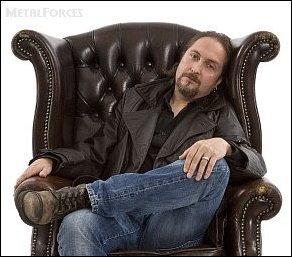
|
I Am Anonymous was completed without thoughts devoted towards inking a record contract. “We made the album the way we wanted to make it,” Adam stresses. “When we were starting the demos for what became I Am Anonymous, labels turned us down because we weren’t heavy enough. They said ‘If you can do this, and do that…,’ and we were like ‘What’s the point?’ I’m not saying I’m a rich man, but we’re not doing Headspace for the money. We earn livings working with other people, other artists. That’s the way we earn our livings. To have a project that you’re so passionate about and be told how to change it to make it sellable was something that none of us were willing to compromise with. We just wanted to make the best album we could, and the album we wanted to make. It took three years, but we achieved it. We did that album the way we wanted to.”
Nonetheless, on March 22nd, 2012 it was publicly revealed that Headspace had inked a record contract with Inside Out Music. “Damian Wilson had done some work with Arjen Lucassen (Ayreon / Star One) previously and he’s signed up to Inside Out, so Damian had had dealings with them before,” the organist expounds. “I think Threshold were signed to Inside Out as well, and Damian was involved with them 10-15 years back. I think he still does some shows with them and stuff now, and he’s been working on a project with them too. He’s had dealings with Inside Out before, and said to me ‘If there’s any label that this would be perfect for, it would be Thomas Waber and Inside Out.’ I got in touch with Thomas; I was actually playing in Germany with Ozzy, and he came to the show.
“We had a coffee and a chat, and I gave him a copy of the virtually finished album. That was how it started, really. He could see what was behind the band and he obviously felt there was potential there to release the record, so that kind of worked well. It worked perfectly for us because they came onboard at the end, and they weren’t involved to maybe try to steer the album one way or the other. They liked where the album had come to, so we knew they were behind the band and they weren’t gonna try to change it. They’re keeping us quite busy with the American release as well.”
Heavy metal pioneers Black Sabbath confirmed a reunion of its inaugural line-up on November 11th, 2011 (a reunion that would later fail to include drummer Bill Ward), and shortly thereafter unveiled European dates to occur throughout May and June 2012. January 9th, 2012 brought the unfortunate news that guitarist Tony Iommi had been diagnosed with the early stages of lymphoma. A homecoming gig at Birmingham’s O2 Academy on May 19th and an appearance at Download Festival in Donington Park on June 10th aside, all of the European dates were scrapped. Instead, a line-up billed as Ozzy Osbourne & Friends were revealed to be honouring the dates, featuring Ozzy’s solo group members, Black Sabbath bassist Geezer Butler, erstwhile Ozzy guitarist Zakk Wylde (Black Label Society), and guitarist Slash (Guns N’ Roses / Velvet Revolver / Slash’s Snakepit).
“We’ve been rehearsing for Ozzy & Friends, which are the shows that are gonna cover the dates that Sabbath aren’t doing,” Adam begins. “Originally this European run for six weeks was supposed to be Black Sabbath. Obviously with Tony Iommi’s illness, he’s not capable of doing all the shows. They’re honouring Download, and I think one American show in August. Not to let the fans and promoters down Ozzy suggested ‘Why don’t we come? We’ll just get some friends up, and make it something interesting to watch.’ Zakk Wylde is gonna get up and play some songs. Slash is gonna be there, and Geezer Butler. It’s gonna be really good, a nice trip I think. The rehearsals went well, and I’m looking forward to getting started.”
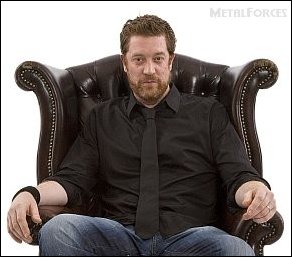
|
At the time of writing, writing and recording sessions for Black Sabbath’s next studio album don’t include the ivory-tinkler’s involvement. “Sabbath has always been the four guys,” he observes. “I play keyboards and a bit of rhythm guitar with them, and it’s side of stage. It’s always been the four of them and the same in the studio, really. Tony is certainly the driving force in that band; he is so good at coming up with amazing guitar riffs. If they need some keyboards, I’m sure they’ll give me a call. It all depends on which route the album takes. If it ends up being more like the early Sabbath albums, then there probably won’t be any keyboards on there. We’ll just have to wait and see, really. If they need me I’m more than happy to go in and play some keyboards on it, but we’ll just have to see how the album takes shape I think really.”
Father Rick guested on the Sabbath cut ‘Sabbra Cadabra’, included on fifth studio opus Sabbath Bloody Sabbath (December 1973). “Incidentally, that’s just triggered a memory,” Adam responds. “I was out in America recording the Scream album with Ozzy a couple of years ago and in the studio Ozzy showed me this old vintage synthesiser, an ARP 2500. I said ‘That’s amazing. Let’s get it working.’ We got it up and running and I used it on one of the songs, for a little bit on an intro. He said ‘The last person to play that keyboard was your dad in 1973 in Morgan Studios when we were recording Sabbath Bloody Sabbath.’ I thought that was just a great tip of the hat to the past, to get the same synth on a new recording with Ozzy. It was great.”
Tenth Ozzy Osbourne studio full-length Scream (June 2010) boasted five numbers co-penned by the pianist, namely ‘Let It Die’, ‘Diggin’ Me Down’, ‘Fearless’, ‘I Want It More’, and ‘I Love You All’. Its re-release raised that tally to six, additionally featuring ‘Hand Of The Enemy’. A follow-up seems destined. “We did start writing for an album with Ozzy on the last tour, and got some ideas together,” he imparts. “Gus and I were putting some things together and Ozzy was putting some vocals on, but once the Black Sabbath thing came about his focus had to be on that. We kind of took a step back. We’re just ready to go when required, really. He’s not gonna stop making albums and making music, because that is his true passion. We’ll just have to wait and see what happens at the end of this run with Sabbath. Obviously he’s recording the Sabbath album, and that’s gonna take up his time at the moment. Once that’s all finished and done, then we’ll probably start working on an album.”
Should said musical ideas crystallise, fervent admirers of Ozzy’s early solo material will be pleased. “It was probably more similar to the early stuff, certainly the stuff Gus was coming up with,” Adam judges. “It was all in very, very basic form, so they were just ideas really. It’s hard to kind of pinpoint where they will end up or if anything will materialise from those ideas, but I know that Ozzy was very keen to do an album in an old school manner. We would go to a studio for several weeks, all write, and come up with some stuff together. If that happens, then great. Things change all the time so it could end up being completely different, but we’ll see what happens once he’s ready to record another album.”
I Am Anonymous was released in Germany, Austria, and Switzerland on May 18th, 2012, on the 21st in the rest of Europe, and on the 22nd in North America, all via Inside Out Music.
Interview published in May 2012.
Related Posts via Categories
- SCOTTISH SICKNESS – A Report On The Scottish Death Metal Scene, Featuring BRAINBATH, PUTRID FATE And RANCID CADAVER (October 2022) | Features / Interviews @ Metal Forces
- LARVAE – Join The Hardcore Cult! (June 2022) | Features / Interviews @ Metal Forces Magazine
- TRENCH FOOT – Sacrificing Morals For Gory Obscenities (June 2022) | Features / Interviews @ Metal Forces Magazine
- L.A. GUNS – Trigger Happy (March 2019) | Features / Interviews @ Metal Forces Magazine
- CANCER – Crimes So Evil (November 2018) | Features / Interviews @ Metal Forces Magazine
- U.D.O. – The Tank Drives On (August 2018) | Features / Interviews @ Metal Forces Magazine
- SIEGE OF POWER – Bleeding For The Cause (August 2018) | Features / Interviews @ Metal Forces Magazine
- MOONSPELL – A Taste Of Live Eternity (August 2018) | Features / Interviews @ Metal Forces Magazine
- MONSTROSITY – Dark Matter Invocation (August 2018) | Features / Interviews @ Metal Forces Magazine
- SATAN – Five Magicians (August 2018) | Features / Interviews @ Metal Forces Magazine
|
|





